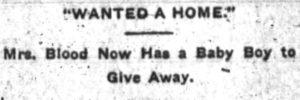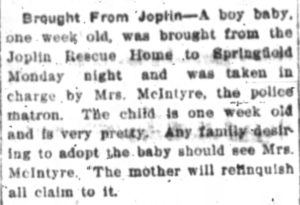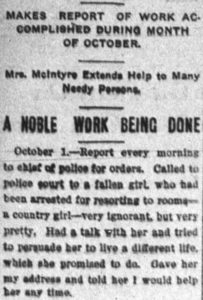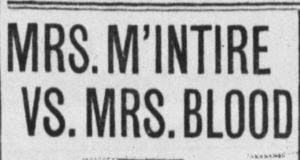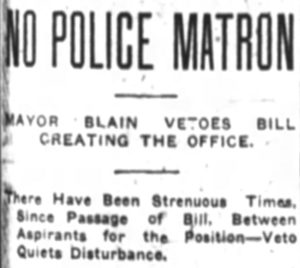
By May 1904, Susan McIntire was out of a job. At a meeting that month of the Southside WCTU, McIntire is referred to as “ex-police matron.” The ordinance creating the office of police matron had been repealed in April.[1]
It was spring 1906 before the position of police matron became news again. Mrs. McIntire asked city council to “reinstate her old position.” The WCTU supported her quest for the position, and this time she wanted a salary of $40 per month. She asked Mayor Blain for his support and went to all 16 members of the council asking for their support, as well. It was all for naught; the mayor said it was unlikely that the position of police matron would be created again, and it appears the majority of the council members agreed.[2]
Surprisingly, in May the city council passed a bill that would have given Springfield a police matron, salary included. Again backed by the WCTU, McIntire tirelessly advocated for the office and the position. But as usual, she was not the only one who wanted the job. Mrs. C. C. Blood returned from a trip to California around the time the bill was passed and immediately threw her hat in the ring. She even offered work without pay. This angered McIntire’s friends and the mayor was suddenly deluged with her supporters advocating on her behalf. With the possibility of the office being reinstated, competition between the two women renewed. The mayor, possibly in fear for his life, vetoed the bill. There would be no police matron in Springfield, McIntire or Blood, paid or unpaid.[3]
[1] Springfield Republican, May 15, 1904.
[2] Springfield Republican, April 29, 1906.
[3] Springfield Republican, May 17, 1906.
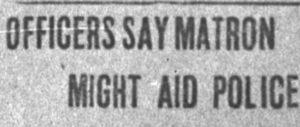
The subject appears to have been closed until 1910, at which point Mrs. Blood passed a petition around Springfield asking for the “establishment of the office of police matron.” She thought Springfield should follow the lead of larger cities in having a police matron to help women and children. Of course, she also believed she should have the job.[4]
This time around there was support from several police officers, particularly ones who had previously worked with McIntire and saw the value of the position. A bill went before the “police committee and the mayor.” Still, it took another six months before city council finally created the office of police matron, and at a salary of $50. Before the council acted, there was public discussion in which “the women participated equally as much as the councilmen.” Several women attended this meeting, but Mrs. Blood and Mrs. McIntire were not among them. After some debate, the bill was passed and Mayor Robert E. Lee “asked the women the name of their candidate for police matron.” To the shock of the councilmen and the mayor, the women’s delegation requested that an “experienced women” be brought from out of town; they did want a local woman, with little or no experience, to take the job. Blood and McIntire were not mentioned.[5]
[4] Springfield Republican, April 29, 1910.
[5] Springfield Republican, May 5, 1910; June 8, 1910; December 14, 1910.
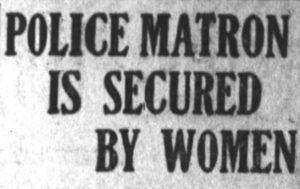
It was December of that year before the position was finally filled. It was Mrs. Kate Cozzens who was appointed by Mayor Lee to be the new police matron, now a paid position. Cozzens and her husband had moved to Springfield from Buffalo, New York, two years previously, where she had once worked as a probation officer in juvenile court. Because of lack of space in City Hall, Cozzens was given a desk in the mayor’s office. Within days of assuming the job, she became a widow when her husband, Charles D. Cozzens, died of an aneurysm.[6]
By January, Cozzens seemed to be making friends and making a good impression on the community. Her work was much the same as that of her predecessor, Mrs. McIntire, although she occasionally aided the police in apprehending female criminals.[7]
A “throat trouble” landed Cozzens in St. John’s Hospital in late February.[1] She was in the hospital for a few days before being released, but was expected to remain at home for a few days of recovery.[8]
Kate Cozzens was fully recovered by the end of March. Recovered enough, in fact, that on March 30 she married the man whose office she shared—Mayor Robert E. Lee.[10]
[6] Springfield Republican, December 24, 1910; January 7, 1911; March 31, 1911.
[7] Springfield Republican, January 27 and 28, 1911.
[8] Springfield Republican, March 1, 1911.
[9] Springfield Republican, January 27, 1911; January 28, 1911.
[10] Greene County Recorder of Deeds, Marriage Records.
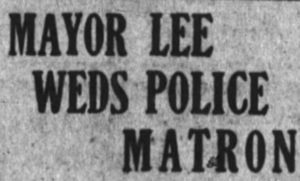
The couple were secretly married that evening by Rev. Dr. Frank L. Moffett, pastor of the South Street Christian church. The news came as a “great surprise” the next day, both to the Springfield community and to their friends. A few close friends knew of the relationship but did not expect a wedding until “early fall,” and none were invited to the ceremony. Due to the mayor’s busy work schedule, no honeymoon was planned. Instead, they intended to begin repairing his home on N. Washington Avenue. It was announced that the new Mrs. Lee would soon resign as police matron and “begin at once her duties as mistress of the household of the chief executive of the city.”[11]
[11] Springfield Republican, March 31, 1911.
Stay tuned for part 2 of the Scandal!
